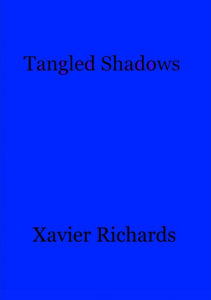★★★ 
Tangled Shadows by Xavier Richards is a dark, brutal, and self-reflective novel of modern life.
For readers seeking a painstakingly honest, post-modern crawl through the life and times of a nearly lost soul, Tangled Shadows is an excellent choice. However, for those expecting a traditional narrative with peaks, valleys, growth, and a satisfying conclusion, it might be best to look elsewhere. Xavier Richards delivers a probing and thought-provoking look into a listless and seemingly depressed man, Alex, who is caught in the sludge of Chicago’s millennial class – broke, alone, uncertain of the future, and relatively certain that he has a substance abuse problem.
The author pulls readers through the mental narration and Bukowski-esque scenes of Alex’s life, from fortuitous meetings with new women to pensive sessions drinking alone, with a narrow focus on sex, alcohol, drugs, and open-ended existential questions that never get answered. There are moments of maturity in the dialogue and narration, but this is coupled with over-informing readers of Alex’s headspace – a classic “show, don’t tell” mistake of authors.
There is also a strong sense of malaise, felt as a neutral wet blanket over the entire story. There are no great joys or great sorrows, even during the ecstasy of sex or the thrill of a new romantic interest. Alex seems perpetually apathetic, which may shed some light on the author’s goals. This is not meant to be an uplifting story, because life in a big city can be brutal and cold; it can make a person hard and unwavering in their belief that the present is as good as life will get.
There is simplicity to Richards’ writing, thanks to its choppy, declarative sentences of prose, but there are also poetic twists within the honest narration, nearly reminiscent of Salinger, at times. The style doesn’t seem contrived, and Alex’s daily movements and thought processes seem ripped from personal experience; there is a level of detail and intimacy within the novel, particularly in his interactions with women, that give this book a clear autobiographical feel. This makes the book much more relatable, especially for twenty- or thirty-something readers in a similarly anonymous urban landscape.
The constant focus on sex becomes a bit repetitive as the book progresses, simply because the initially realistic depiction of romance in the 21st century begins to turn surreal and unbelievable in certain ways. Alex and the author are both trying to explore the value and emotional implications of sex, but progress doesn’t seem to be made throughout the course of the book.
The terse prose at the beginning of the story, which suggested so much between the lines, eventually shifts to pure storytelling, even during uninteresting moments, like the stereotypical scene of a generic party – beer pong and all. For every sporadic moment of profound prose, or clever turn of phrase about philosophy and modern existence, there is another hackneyed line or awkward bit of dialogue, which occasionally interrupts the flow of the read.
Overall, Alex is less poetic than Holden Caulfield, less bold than Bukowski, less profound than Kerouac, and less believable in his misery than Camus, but perhaps that is the point of the book; we will never have lives as romantic as our heroes, nor will we write like them. As a brief existential musing on modern life, Tangled Shadows delivers, but the book seems to be missing its heart, which may or may not be the author’s intention.
Review Overview
Design
Editing
Content
Get an Editorial Review | Get Amazon Sales & Reviews | Get Edited | Get Beta Readers | Enter the SPR Book Awards | Other Marketing Services























Leave A Comment